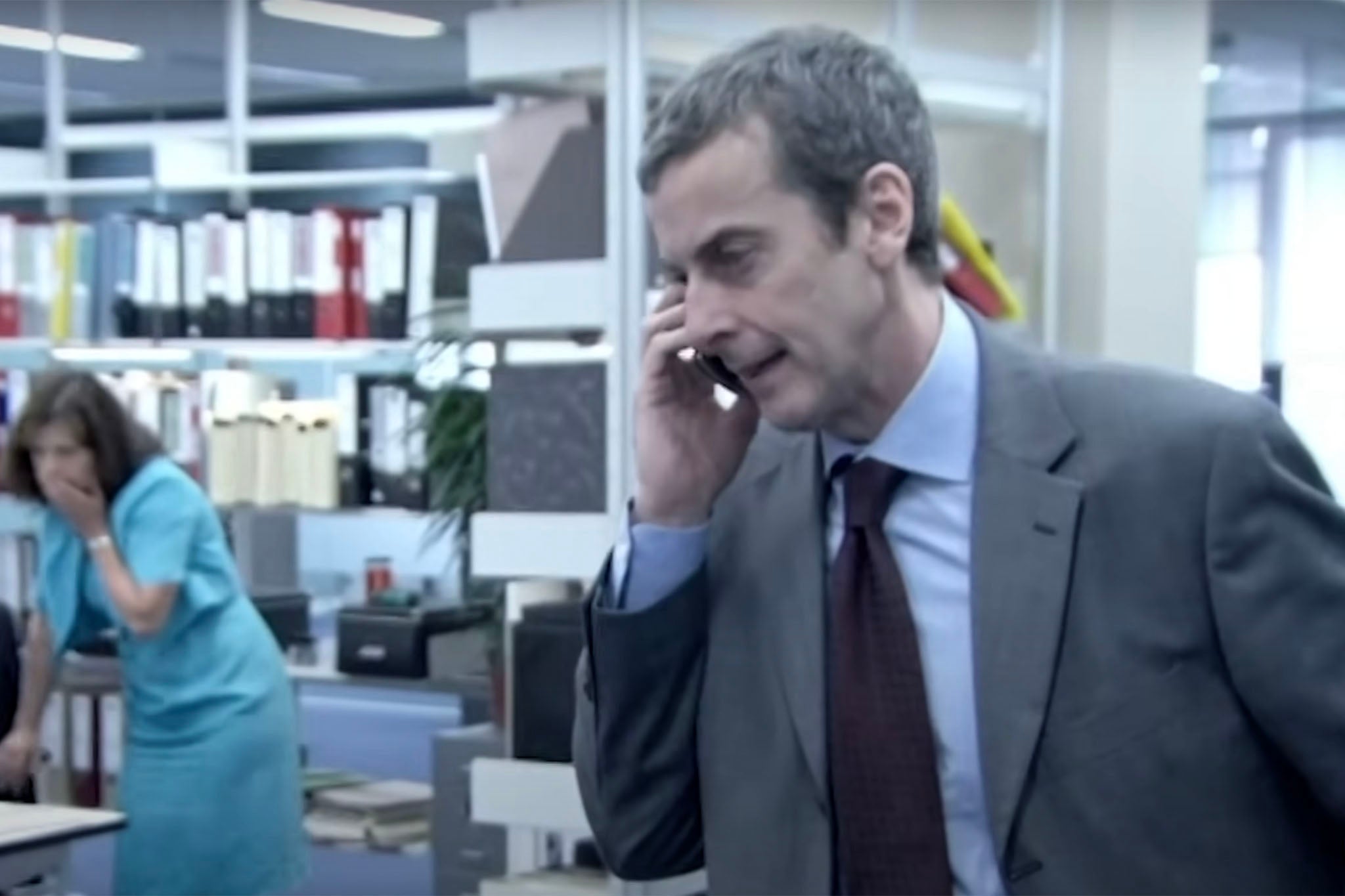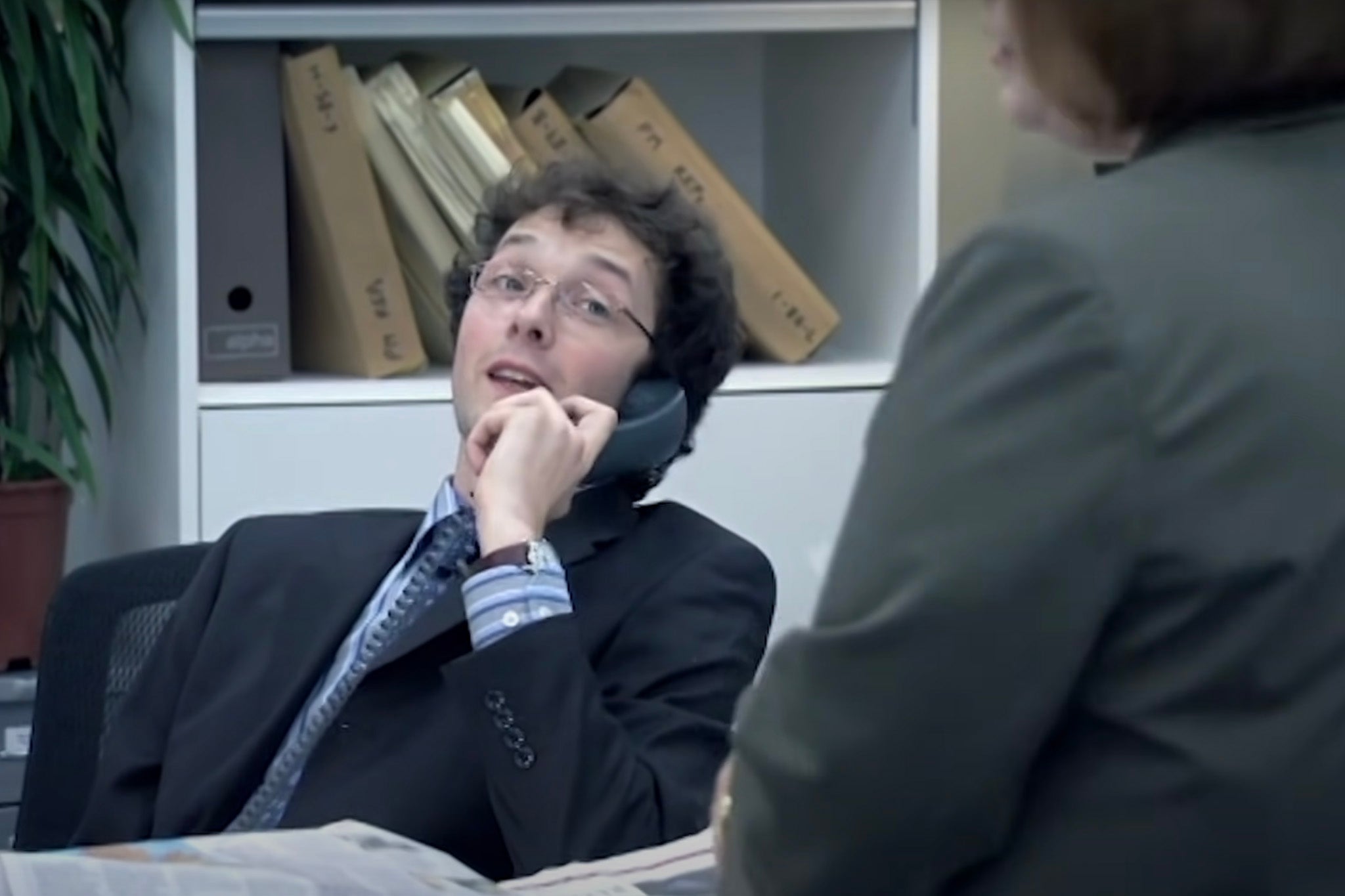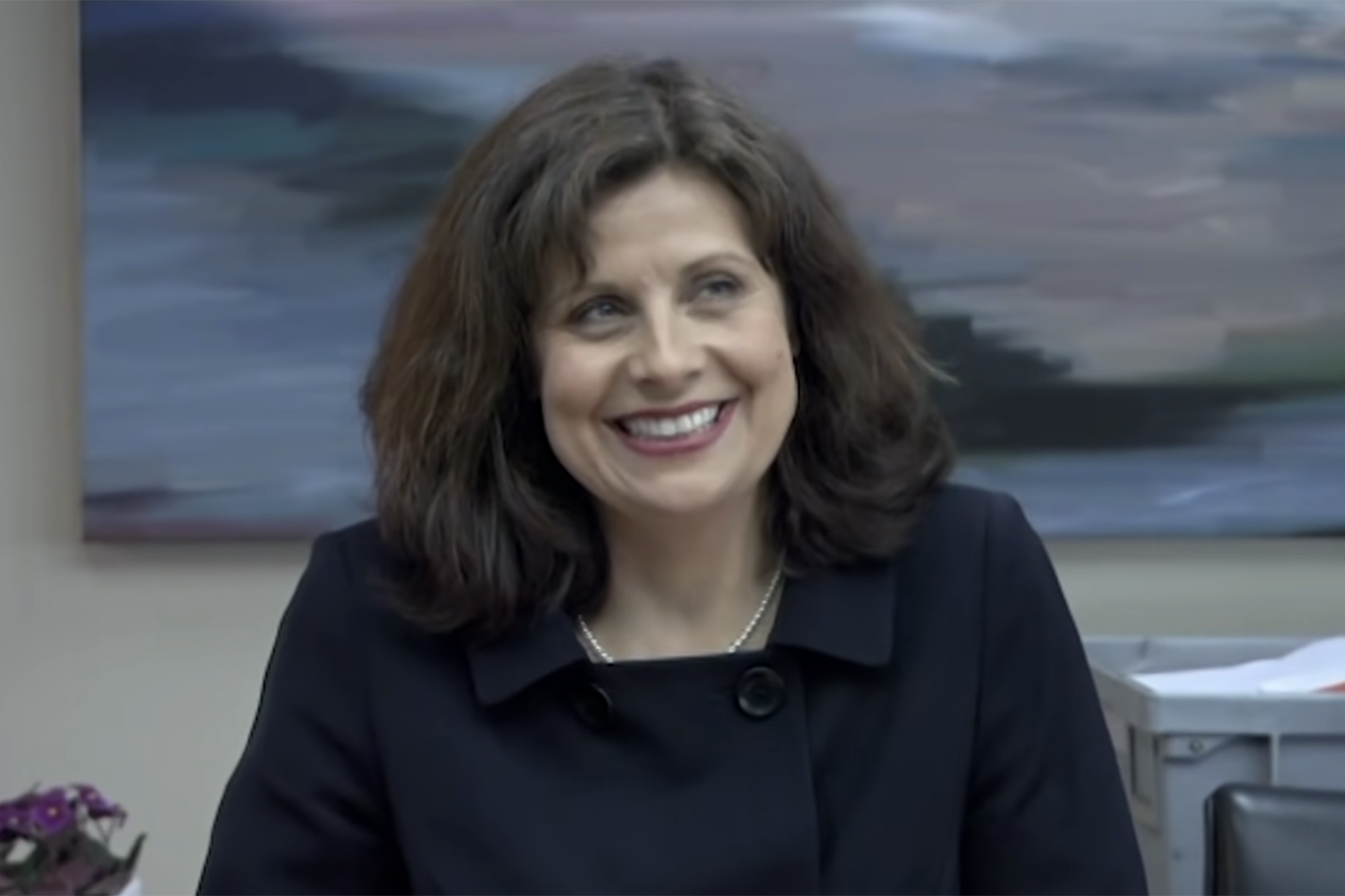It takes about one minute for a verbal grenade to be lobbed in The Thick of It’s first episode. Spin doctor Malcolm Tucker, played by Peter Capaldi, is on the phone, mouthing off about an MP, who, in Tucker’s estimation at least, is not just totally rubbish at his job, he’s “as useless as a marzipan dildo”. As insults go, it’s lewd but also ludicrous, utterly damning yet surreally silly. And, as the show’s creator Armando Iannucci says, it “sets the tone for everything” to come.
Over the course of four series and one Oscar-nominated spin-off film, The Thick of It raised the bar with some of the most creative invective ever heard on television. The political sitcom, which debuted in an appropriately post-watershed late slot on BBC Four on 19 May 2005, ushered viewers behind the scenes in the fictional – but all too realistic – Department for Social Affairs (it would add Citizenship to its cumbersome remit in later seasons).
And ever since it came to an end in 2012, real-life politics seems to have come to closely resemble, well, a scene from The Thick of It. A soggy Rishi Sunak announcing the 2024 election outside Downing Street, only to have the whole thing drowned out by the strains of “Things Can Only Get Better”? Then doing a photo call in Belfast’s Titanic Quarter, and fielding inevitable questions about “sinking ships”? It was a double whammy of f*** ups that you can imagine the show’s hapless minister Nicola Murray (Rebecca Front) attempting to style out with a rictus grin.
The show’s world is one of incompetent special advisers (SpAds), out-of-touch ministers and harried press officers, all having their strings pulled by Tucker, the vituperative puppetmaster. And while these Westminster lightweights flail from crisis to crisis, ideals stamped out of them long ago by the drudgery of their work, they engage in verbal combat, slagging each other off with an abandon that’s sometimes gleeful, sometimes just desperate.
Tucker is the undisputed eviscerator-in-chief, spewing bile with disconcerting speed and acuity. “You’re so backbench, you’ve actually f***ing fallen off,” he tells one beleaguered MP; he describes another as “so dense that light bends around him”. When he condemned Murray as an “omnishambles”, the coinage proved so irresistibly apt that it entered the political lexicon soon after, with Ed Miliband borrowing it for Prime Minister’s Questions in 2012.
The apocryphal story is that Malcolm is based on Tony Blair’s PR attack dog Alastair Campbell, who’s now selling out arenas as the co-host of The Rest Is Politics, the podcast beloved by centrist dads everywhere. Iannucci, however, has previously said that Capaldi’s character was more of a composite, based on types who “lurk in No 10” and berate journalists “for not writing what they want”. He also surely has shades of former Labour minister Peter Mandelson, the so-called “prince of darkness” who’s now ambassador to the United States.

The colleagues stuck in Tucker’s malevolent orbit also try to give as good as they get. And the opposition, when we meet them, are just as fond of expletives (so much so that their election strategist, played by Tom Hollander, is commonly referred to as “The F***er”). No one, and nothing, is safe from the show’s acidity – including this paper. In the 2007 special “Spinners and Losers”, a Daily Mail editor breaks down having spent an evening rejigging his front page in response to chaotic, contradictory tip-offs emanating from DoSAC. “It’s not like we’re The Independent,” he bleats. “We can’t just stick a headline saying ‘Cruelty’ then stick a picture of a dolphin or a whale underneath it. I mean, that’s just f***ing cheating.” Ouch.
In 2004, Iannucci, co-creator of Alan Partridge and veteran of comedies such as The Day Today and his self-titled Channel 4 sketch show, took part in a BBC series called Britain’s Best Sitcom. He’d made the case for Eighties Whitehall satire Yes Minister, and while rewatching it, an idea emerged. Why hadn’t anyone tried to skewer the very different political culture under New Labour, with SpAds and communications gurus taking centre stage, rather than civil servants?
If you just say the same word again and again, it gets boring, so how do we make the swearing interesting?
He wanted to create something that was “rough and ready”, a show that felt “as if we were eavesdropping on something that we shouldn’t see or be privy to”. When he started to speak to people who’d worked in that environment, the overwhelming impression was that “it was very frantic and fraught” as well as “quite intensely macho”. To convey that stress, he says, “there’d have to be swearing. Then it was a case of, if you just say the same word again and again, it gets boring, so how do we make the swearing interesting?”
Iannucci set about assembling a team of writers who could do precisely that. Initially, that group comprised Simon Blackwell, Tony Roche and Peep Show co-creator – and future Succession showrunner – Jesse Armstrong (who named a couple of characters, Malcolm included, after members of his five-a-side football team). The production “didn’t have the money to do an American-style writers’ room”, Blackwell says, so they’d work separately, then send their scripts back and forth over email, drafting and redrafting, with “Armando at the centre of it, giving notes. He was always the nucleus.”
To add even more punch to the slanging matches, Iannucci contacted writer Ian Martin after reading “a send-up of parliamentary language” on his satirical website Martian FM. Martin had “never seen a script, any kind of script whatsoever” when he received a copy of the first episode, along with the instruction to “just sprinkle your swearing s*** all over it”, as he puts it (in true Thick of It style).
His first addition was that “marzipan dildo” jibe. “He would add stuff that would come back, initially, in red type,” Iannucci recalls. “And it was always really funny, to the extent that every morning we were waiting for the fresh batch, and everyone was poring over [the scripts], looking for the red bits.”
In one early interview, Iannucci hailed Martin as the show’s swearing consultant. “Obviously the press loved it – what a job title, right?” says Martin. And so it stuck, even though, he says, it wasn’t entirely accurate (particularly as he joined the writing team proper in later seasons). “It was a bit arbitrary, but a brilliant mythologising of what the role was.” He’s quick to note that “every other writer” on the series “wrote great swears” – to the point that, he jokes, it “actually got a bit depressing, because mates watched the show and said, ‘Come the f*** in’ or ‘F*** the f*** off, was that you?’ and I’d go, ‘No, actually it wasn’t...’ ‘Tinker, Tailor, Soldier, C***, was that one?’ ‘No, that wasn’t mine either...’”
The writers worked quickly, coming up with multiple zingers at speed so Iannucci could pick out the line that worked best (“There’s probably a whole volume of them that we haven’t used,” he says). That frenetic pace off screen made the onscreen havoc feel more authentic: it created “a reflexive relationship between the way the show is being made and the show [itself]”, as Armstrong puts it. There was never “quite enough time, there wasn’t quite enough money, there were a lot of scripts, a lot of pressure”, he says. “So it was somewhat like being in a government office, not having enough time to write the speech or write the policy. I think that energy infects the show.”
Often, they’d leave writing Malcolm’s lines to the very end of the day, when they were feeling particularly frazzled, as a little treat. “If we’d managed to get the plot sorted, and there was a bit of time, we could do some Malcolm insults,” Iannucci says.
Martin, meanwhile, remembers coming up with one of the show’s most unhinged monologues “in real time”, while in bed recovering from a lumbar puncture. In the scene in question, Jamie (played by Paul Higgins), the feral leader of Malcolm’s “Caledonian mafia”, threatens precocious SpAd Ollie Reeder (Chris Addison) in an especially graphic way: he promises to “remove your iPod from its tiny nano-sheath and push it up your c**k”, then “put some speakers up your arse and put it on shuffle with my f***ing fist”. Pure poetry, right?

The original line was something as straightforward as “I’ll f***ing kill you”, Martin explains, but “I was in such f***ing pain, I mean, dazzling pain, that I just thought, ‘No, f*** it, this is what he’s going to do to Ollie.’” And so Jamie’s mad screed was written down in “literally the time it takes to hear it – that’s the quickest one I’ve ever done. I was in a lot of pain at the time, and Jamie was a proper f***ing outlet, a proper release.”
A character’s looks could provide a rich vein of not entirely flattering inspiration for offhand remarks. “We had to tell anyone new to the cast, if they were in for an episode or two, ‘You must be prepared to have lines thrown at you about your physical appearance,’” Iannucci says. “‘We don’t mean it. It’s just that all these people are bullies, and that’s how they work.’” Blackwell recalls feeling bad for actor David Haig, who joined the show in season three as rival spin doctor Steve Fleming (a man who’s almost as scary as Malcolm, albeit in a more unctuous way). “We were calling him a ‘Lego policeman’ and all sorts in the readthrough,” he says (Haig, ever the pro, “was lovely about it”).
Addison’s “lanky appearance” often became the butt of jokes too, Blackwell adds. “There was a lot aimed at Chris, actually, God bless him, quite personal stuff, but he was fine about it once he knew that it happened to everyone.” His amenability led to some of the show’s most memorable lines, like when Malcolm attempts to hunt down Ollie by telling another colleague, “I’m looking for Mr Oliver Reeder; he looks a bit like a Quentin Blake illustration.”
There was also an intricate hierarchy at play: the characters at the top of the food chain, like Malcolm and Jamie, have all the verbal power, whereas those lower in the pecking order try to copy them, with very varying levels of success. “Malcolm is good at it, he’s savage,” says Armstrong. “He sniffs out people’s weak points and attacks them. Other people should not be speaking in the same register; if they are, then that’s bad writing.”
You can quickly get into self-parody, so you have to beware that
Sometimes, of course, the humour lies in how rubbish a character’s swearing is. Terri Coverley, the head of comms played by Joanna Scanlan, is comically abysmal in a slanging match; it goes against every impartial bone in her civil servant body (calling a journalist “Simon arsepipes” is as mean as she gets). Still, you imagine that she’s the one character who’s clung on to their position long after the show ended. “She’s probably got Sue Gray’s old job,” Iannucci suggests.
It might have seemed like Tucker and co were chucking expletives around indiscriminately, but that wasn’t the case. The BBC kept a reasonably close eye on the amount of swearing. Blackwell recalls the writers having to “do some deals” on the “c***-f*** exchange”, while Iannucci remembers being told: “We could allow you three c***s if you bring the f*** rate down from 10 a minute to seven a minute.”
In fact, “on a regular basis”, he would “ask for the script to be de-f***ed”, because “I didn’t want it to feel tired or repetitive,” he says. “Inevitably when we were getting closer to the shoot and encouraging the cast to loosen it up a bit and improvise slightly, while they’re trying to think of something to say, they’d swear, just as a backup.” Swear words, he adds, are like “wild flowers – if you let them grow to a certain level, it’s beautiful, but then they can get out of control and it just looks like a mess”.

Some of the most memorable insults were indeed swear-free: they managed to pierce a character’s veneer of competence (or arrogance) in other, equally devastating ways. One of Blackwell’s favourite lines comes from spin-off film In the Loop, when Jamie “says ‘Shut it, Love Actually’ to Chris [Addison]’s character. It’s not swearing, but he’s absolutely nailed the kind of privileged SpAd he’s talking to.”
Armstrong remembers trying to avoid that temptation to overwrite. “Certainly after the first series, Arm[ando] was already crossing out swear words and the more baroque constructions of words, because you can quickly get into self-parody, so you have to beware that,” he says. In his view, the show is “best when it’s reflecting reality. It’s not that you want to get the most outlandish version of swearing in it.”
The Thick of It worked, he believes, because it was “a good reflection of how those people were operating in politics, and that brutality”. They always wanted each line to feel like it had been blurted out under pressure. “You’re trying to press down on that stuff and keep it really real. And if you still get an eruption of volcanic swearing that can still feel real, then it really works. If it just turns into a kind of s***show of f***ery, then that could become tiresome for the audience and for the actors as well. They don’t want to just become these dancing dogs spewing filth.”
Iannucci never wanted the script to feel like “it was trying too hard” or as though “we wanted to show off our next insult”, slotted in from a list. And, he adds, he also wanted to capture something “quite depressing, really” about that whole political culture, “about Malcolm and that very aggressive, but destructive, attitude”.
Capaldi’s character, he says, “wouldn’t last 10 seconds” today, “because he’d be done for bullying, verbal abuse, emotional abuse, all those things. And I did want it to feel quite shocking to people. I suppose that was part of the reason why, after the number of episodes we did, we felt that was probably enough: we didn’t want people to get used to it, or it to feel just part of the furniture, you know?” Twenty years on, it certainly retains that glorious shock factor.
‘The Thick of It’ is available to stream on BBC iPlayer
Forever radically reimagines Judy Blume – but proves how essential she still is
Andor should have been a Game of Thrones-size hit – why isn’t it?
The latest Last of Us episode will take years to really make sense
Inside ITV’s The Assembly, the most groundbreaking TV show of the year
Bafta TV’s Best Drama winners ranked, from Happy Valley to Shameless
Netflix has done something very different with Four Seasons – this is why it works







